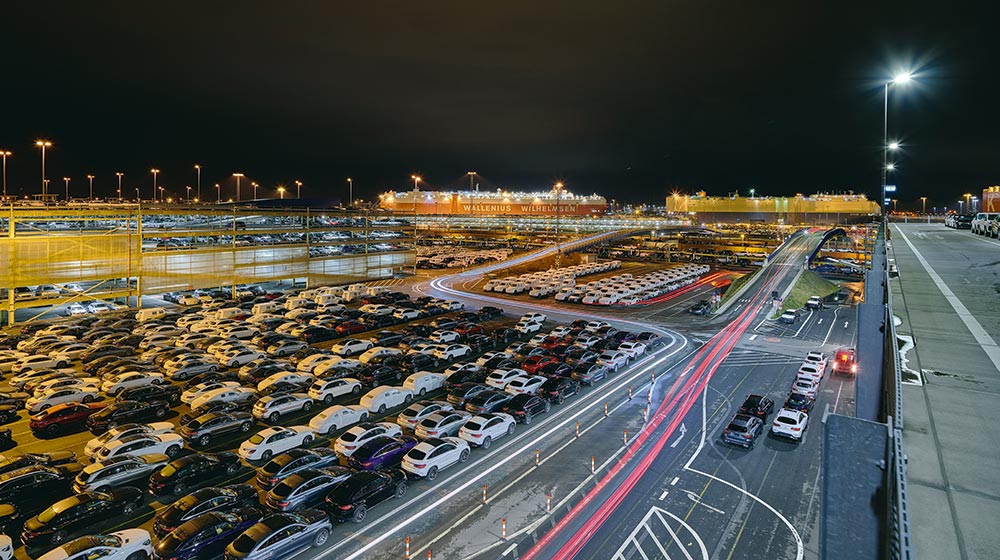
Michael Hollmann
For the first time in Bremerhaven, a shipping company will be directly involved in transhipping cars. Similar partnerships with Maersk and MSC have already been in place for years at Bremerhaven’s container terminals. On December 14, Bremen-based port and logistics group BLG Logistics signed an agreement with Korean shipping company Hyundai Glovis to establish a joint venture. Since January 2022, the ships of the world’s fourth-largest carrier are loaded and unloaded exclusively by the joint subsidiary BLG Glovis Bremerhaven at two specified berths in the north port.
The shipping company will be provided with an area of 100,000 square meters for around 5,000 vehicles. BLG CEO Frank Dreeke considers the agreement, which has been in the pipeline for almost two years, a “huge success” and a “very important milestone” for the second largest automotive port in Europe after Zeebrugge. “This partnership connects one of the world’s largest car carriers with Bremerhaven, and they are now setting up their European hub here.”
Hyundai Glovis – part of the Hyundai Kia Automotive Group and represented in Germany by the Stena Glovis agency – has been one of BLG’s biggest customers in Bremerhaven for years. The company’s shipments to and from Asia are said to account for more than a quarter of the total turnover at the Bremerhaven car terminal. In addition to cars from Hyundai and Kia, this also includes those from third-party customers such as Volkswagen.
In a normal year, Bremerhaven tranships more than 2 million vehicles; in 2020, volumes plummeted 20 percent to 1.7 million due to the pandemic. “Hyundai Glovis is pursuing a clear growth strategy for which we need a trustworthy partner. BLG has proven its reliability over many years of cooperation,” Hyundai Glovis CEO Tae Woo Kim was quoted as saying in a joint statement.
The partners do not want to comment in detail on the quantities planned for the shipping company’s future European hub. Of course, the goal is to bundle volumes there, they said. “The joint venture agreement is designed for growth. Initially, this will be import cargo on a large scale from the Asia region,” says Andrea Eck, who is responsible for the automotive logistics division on the BLG board of management.
In addition to Bremerhaven, the Korean company’s ships also call at other important Ro/Ro ports in northwestern Europe, such as Zeebrugge, Antwerp and Emden. The choice of Bremerhaven as a hub was also based on its additional technical services and good intermodal connections. “This is where our BLG-owned network comes into play with rail and road transport, as well as the inland terminals,” Eck stresses.
At the same time, BLG emphasizes that there will be no unilateral preference for Hyundai Glovis when it comes to ship handling: “As a universal port, Bremerhaven remains open to all shipping companies.” A significant statement, since the partnership is being observed closely and with a degree of mistrust by other carriers, as there are always seasonal peaks in transhipment when berths become scarce.
The fact is that the Korean company will enjoy operational advantages with the reserved storage areas and the two berths associated with them, above all because these will allow them to reduce distances during transhipment, which will increase productivity. However, Hyundai Glovis will still have to register its ship calls through BLG’s general slot system like all other carriers. “So other shipping companies won’t be at a disadvantage,” says Eck.
The advantage for Hyundai Glovis, she says, is that they always get the same berths, whereas other carriers’ ships are handled at different locations.
Do you have a special request?
Contact us if you would like to learn more about the efficiency of German logistics!